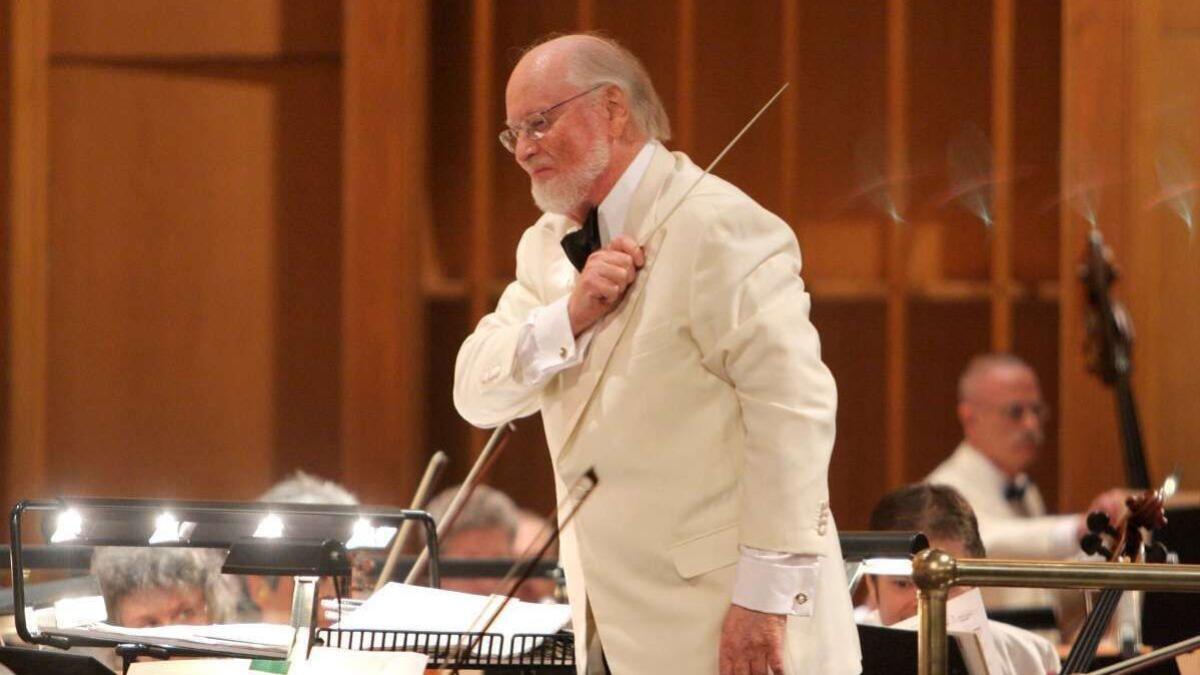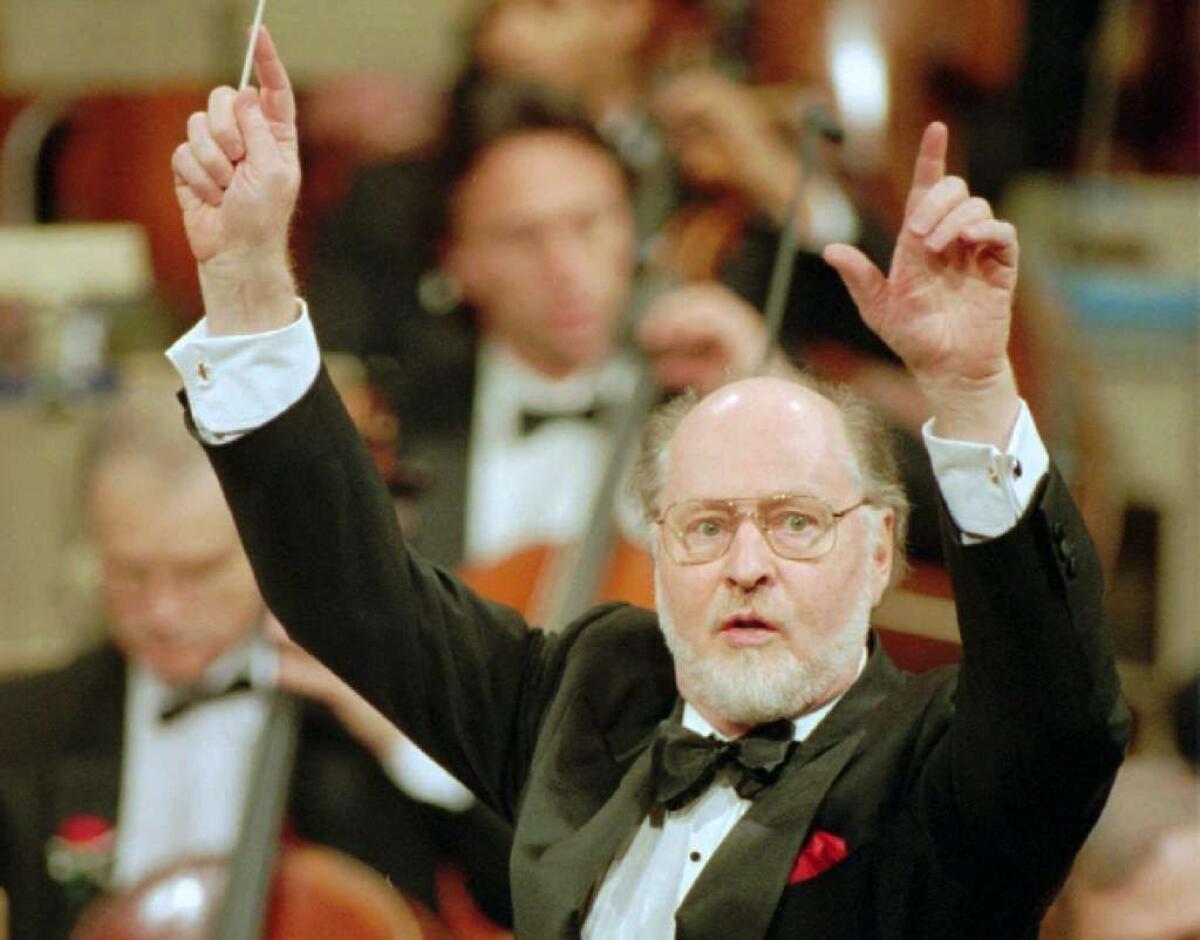John Williams’ early life: How a NoHo kid and UCLA Bruin became the movie music man

John Williams is synonymous with Hollywood. The “Star Wars” composer, who has racked up an incredible 51 Oscar nominations, could easily be called the composer laureate of American cinema.
He’s cemented his stronghold on modern ears by conducting concerts of his movie music, and this summer marks the 40th anniversary of Williams bringing his repertoire to the Hollywood Bowl. Before he takes the podium Aug. 31, there will also be live-to-picture performances of his beloved scores for “Star Wars,” “The Empire Strikes Back” and — this weekend — “Jaws.” (David Newman will conduct those performances.)
But his Hollywood story didn’t begin with Steven Spielberg’s 1975 shark thriller, or even his early years scoring TV series like “Lost in Space.” It started seven decades ago, about six miles up the 101 Freeway from the Bowl, when Williams was still a curly-haired teenager at North Hollywood High School and had, according to a 1949 Time magazine article, “the hottest band in Hollywood.”
“They were playing only three nights a week,” the piece reported — “schoolwork kept them from doing more.… The surest sign that they were really arriving was the hushed way the fans listened when the boys sat in with jazzbos like drummer Zutty Singleton out at the Club 47, a Ventura Boulevard bistro where the best of Hollywood’s radio and movie musicians go after work to jam.”
How much gold can lie in 45 Oscar losses? In the case of John Williams, the answer is: Tons »
Williams arrived in Los Angeles in 1948. His father was a jazz drummer in the Raymond Scott Quintette (best known for their hit “Powerhouse,” a staple of Looney Tunes cartoons), and played in the house bands for radio shows in New York. When one show, Lucky Strike’s “Your Hit Parade,” moved to television, Johnny Williams Sr. moved his family out here with it. He then joined the staff orchestra at Columbia Pictures, where he played on dozens of film and TV scores.
Johnny Jr. was only 16, but already a talented jazz pianist.
“They had what they called a ‘kicks band’ at Columbia Pictures, where the guys would get together and play each others’ charts,” said Williams’ younger brother, Jerry Williams, 81. “Dad would bring John along, and everybody would go, ‘Hey, wait a minute — who’s the new piano player?’ So he was introduced and recognized very early on, because he was, and is, a great piano player.”
Williams, who started taking lessons at 7, slept near his piano in the garage apartment of his folks’ home on Vantage Avenue in North Hollywood, and he practiced religiously (a discipline he still maintains at age 86).
“He was at the piano all day,” said the composer’s other brother, Don Williams, 16 years his junior. “My mother would send me out there: ‘Tell John dinner’s ready.’ I’d go out. ‘Hey, John, dinner’s ready!’ ‘OK, I’ll be there in a minute.’ Fifteen minutes later, my mom would send me back out there. He just loved to work. That’s always the way he’s been. Can’t be away from his piano — doesn’t want to be away from the piano. Why should he?”
He studied with several teachers, the most influential being Robert Van Eps at UCLA, who composed piano concertos before becoming a composer and arranger for MGM.

Williams was also arranging jazz numbers for his high school quintet, which included the sons of other famous Hollywood hepcats — including Don Ingle, Gene Estes and Perry Botkin Jr., who all went on to careers in music. “We were pretty rough at first,” 16-year-old Williams told Time, “everybody fighting for their own salad.” But they were good enough to leave sorority dances behind and play legit clubs, and it wasn’t long before Williams was playing solo at the Cocoanut Grove.
The Williams house was a constant jam session. All of Johnny Sr.’s friends were musicians, people like film composer George Duning (“From Here to Eternity”), Perry Botkin Sr. (Bing Crosby’s guitarist) and pianist Claude Thornhill, and they would drop by to talk music and make music, with Johnny Jr. often tickling the ivories.
For teenage Johnny — he went by “Johnny Williams” until 1968 — music was everything. Did anything else matter to him?
“Yeah — girls,” said Botkin, who was good friends with their classmate Barbara Ruick. The “Carousel” actress, daughter of actors Mel Ruick and Lurene Tuttle, would marry Williams in 1956. (They had three children. Barbara Ruick died from a brain hemorrhage in 1974.)
“That was it,” said Botkin. “Otherwise it was all music.”
“As far as going to the beach or bowling or something... no,” said Jerry Williams. “His recreation, his fun and everything else, was always music. If he was going to go out — and we did — we would go to hear a group. He would take me along to hear Oscar Peterson at Sardi’s or something. That was his night out.”
And, foreshadowing his future, he would hang out at the scoring stages where his dad played on sessions for composers like Bernard Herrmann, including the score for “Vertigo.” (“Bernard loved the way he played timpani,” said Don Williams.)
He went to UCLA after graduating in 1950, but was soon drafted into the Air Force. He conducted and arranged for military bands, and while he was stationed in Newfoundland, at age 22, he scored a short travelogue film (“You Are Welcome”) — and the scoring hook was in.
Out of the service, after studying at Juilliard he came back to Hollywood and cut some jazz albums (“World on a String,” “The John Towner Touch”). He quickly became a first-call studio pianist, and played on scores for Henry Mancini (those are his fingers on the “Peter Gunn” theme) and Leonard Bernstein (“West Side Story”). It was only a matter of time before he started scoring his own shows — and we all know how that turned out.
Williams’ brothers both became session percussionists like their father — and like their father, neither of them composes. (“I tried, and it all came out sounding like a harmony exercise,” said Jerry Williams.) All three played on Williams’ scores as his star rapidly ascended, and the brothers still do — most recently on “The Post.”
Williams may have become a world-famous, Oscar-gilded composer, not to mention a lauded concert composer and conductor, since those early days when his friends called him Curley (because of his curly red hair). But he’s never stopped playing.
“I know what John’s doing right now,” said Don Williams, looking at his watch. “It’s about 9:30, 10 o’clock — he’s probably sitting at the piano, working on something. He just doesn’t want to stop. He’s having such a good time, why should he? I think maybe that’s his forte, is the fact that he doesn’t want to stop learning.”
------------
John Williams
Where: Hollywood Bowl, 2301 N. Highland Ave.
When: Aug. 31-Sept. 2
Also: “Jaws” film with a live orchestra to be conducted by David Newman on Friday and Saturday. He will also conduct “Star Wars: A New Hope” on Aug. 7 and 10 and “Star Wars: The Empire Strikes Back” on Aug. 9 and 11.
Info: (323) 850-2000, hollywoodbowl.com
ALSO:
John Williams: Five underrated scores by the AFI-honored composer
How ‘Ready Player One’ became the rare Steven Spielberg movie not scored by John Williams
Why Kobe Bryant hired John Williams to compose the score for his ‘Dear Basketball’ film
See all of our latest arts news and reviews at latimes.com/arts.
More to Read
The biggest entertainment stories
Get our big stories about Hollywood, film, television, music, arts, culture and more right in your inbox as soon as they publish.
You may occasionally receive promotional content from the Los Angeles Times.










